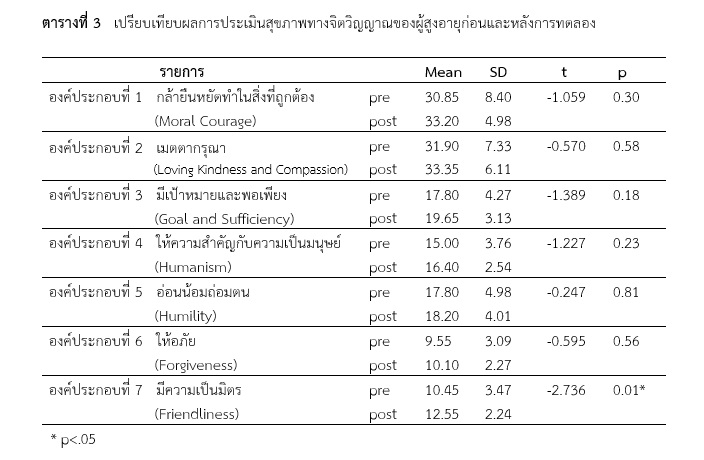THE EFFECT OF THE INTERGENERATIONAL RECREATION PROGRAM FOR ELDERLY
Main Article Content
Abstract
Purpose: This research aimed to study the effect of intergenerational recreation program on holistic health and quality of life in elderly.
Method: One Group Pretest-Posttest Design was used in this research to examine the benefit of the intergenerational recreation program. The participants were 20 elderly volunteers who lived in Muban Laem Thong Niwet community, along with 5-12 years old children. Participants engaged in the intergenerational recreation program for 5 weeks, 3 times a week, 60 minutes at a time. Holistic health including physical fitness, mental health, social health and spiritual health tests as well as quality of life were measured before and after the experiment. Mean and Standard deviation of all data were presented. Dependent-t test was used to determine the mean differeces within group.
Result: It was found that after a 5 weeks of intervention the holistic health of the elderly including physical fitness such as arm strength and endurance score, ability and dynamic balance were significantly higher compared to baseline (p<0.05). Total mental health score, spiritual health (friendly dimension), social health, and quality of life (total score) were also significantly higher after 5 weeks of intervention (all, p<.05).
Conclusion: The intergenerational recreation program in the present study has a positive effect on the holistic health and quality of life in elderly.
Article Details

This work is licensed under a Creative Commons Attribution-NonCommercial-NoDerivatives 4.0 International License.
References
Bosak, S. V. (2017). Benefits of intergenerational connections. Legacy Project.
Cohen, J. (1988). Statistical power analysis for the behavioral sciences. Second Edition. Hillsdale, NJ: Lawrence Erlbaum Associates, Publishers.
Gulthawatvichai, T. (2013). Recreation. 2nd Edition. Bangkok.
Jones, C.J., Riki, R.E. (2002,). Measuring functional. The journal on Active aging: 24-30.
Karnjanakit, S. (2014). Management of Recreation and Tourism, 2nd edition. Bangkok.
Park, A-La. (2015) The effects of intergenerational programmes on children and young people. International Journal of School and Cognitive Psychology, 2(1), 1-5.
Pornrattanaseekul, S. (2016). Innovative Holistic Health Evaluation. A dissertation for the degree of Doctor of Philosophy program. Technopreneurship and Innovation Management, Graduate School. Chulalongkorn University.
Sakuma, N., Suzuki, H., Yasunaga, M., Murayama, Y., Sakurai, R., Ishii, K., & Fujiwara, Y. (2016). Seven-Year Effects of Intergenerational Volunteer Activities on Everyday Activities in Older Adults. The Gerontologist, 56(Suppl_3), 409-410.
Soga, M., Gaston, K. J., & Yamaura, Y. (2016). Gardening is beneficial for health: A meta-analysis. Preventive medicine reports, 5, 92-99.
St. Monica Trust. (2018). A Guide for Older People: InterGenerational Activities How to be part of it and why. Head of Research and Intelligence.
Uhlenberg, P., & Miner, S. (1996). Life course and aging: A cohort perspective. In R. H. Binstock, L. K. George, V. W. Marshall, G. C. Myers, & J. H. Schulz (Eds.), Handbook of aging and the social sciences (pp. 208-228). Academic Press.
World Health Organization. (2009). Meaning of Elderly. http://haamor.com/th, 16 September 2009.
Yasunaga, M., Murayama, Y., Takahashi, T., Ohba, H., Suzuki, H., Nonaka, K., Kuraoka, M., Sakurai, R., Nishi, M., Sakuma, N., Kobayashi, E., Shinkai, S., & Fujiwara, Y. (2016). Multiple impacts of an intergenerational program in Japan: Evidence from the Research on Productivity through Intergenerational Sympathy Project. Geriatrics & gerontology international, 16 (Suppl_1), 98-109.


